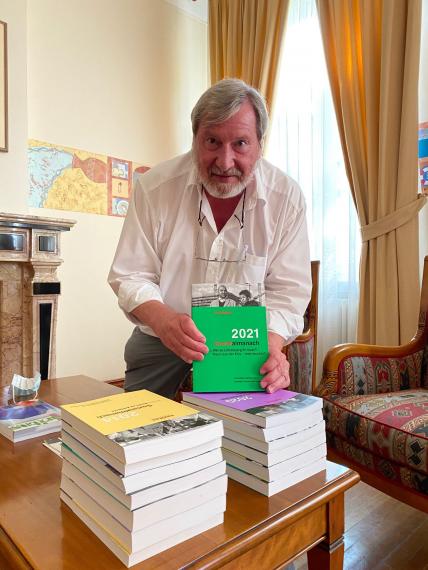
Robert Urbé - Enlightening and feeding the public debate on poverty and social inequality
Friday 9 July 2021
Caritas Luxembourg has just published the 15th and last issue of its Sozialalmanach. Here is a look back on this publication with its coordinator, Robert Urbé.
How did the idea of launching a Social Almanac come about?
There are three factors that played a key role. Firstly, the fact that I have always enjoyed writing opinions on politics and coming up with proposals to improve the situation of people, even before I arrived at Caritas Luxembourg. In 2005, with the Luxembourg Presidency of the Council of the European Union, we created a small task force at Caritas Luxembourg to follow the work of the Presidency in specific areas and to inform the other national Caritas. We were particularly interested in migration issues, the situation in Kosovo and the Barcelona objectives for the development of childcare. This was the beginning of a research and development unit. Another factor that played a role was the impact that the Social Almanac had among our Swiss colleagues, particularly in terms of spaces to talk and listen. Caritas Switzerland has been publishing such an almanac since 1999 and has even adapted it for international cooperation. Finally, our president at the time, Erny Gillen, insisted that something be put in place to support the debate on social issues in Luxembourg. The editorial team therefore met for the first time in summer/autumn 2006 and the first Sozialalmanach was published in April 2007 on the theme of social justice.
After 15 years, can we say that the Sozialalmanach has had an impact?
I think so. Of course, I am not fooled and I know that few people read the Sozialalmanach from start to finish, however I am sure that the many people (politicians, civil servants, representatives, etc.) who receive it take a look at it, read the articles that seem relevant to their field of action and use it as an inspiration for their work. I can see this not only in the references made to the articles in the Sozialalmanach and the number of times the Sozialalmanach is quoted in the Chamber of Deputies, but also, and above all, in the fact that many of the ideas mentioned in it are actually implemented a few years later. Of course, the Sozialalmanach is then rarely quoted, but that is not important as the objective is for people to take ownership of the ideas contained in it. Another merit of the Sozialalmanach, which was pointed out a few years ago by someone who has himself held various positions in the Luxembourgish socio-political arena, is quite simply that it has put the issue of poverty and social inequality on the agenda in a country that is known to be one of the richest countries in the world, and that has denied the issue for a long time. I think that Caritas Luxembourg has succeeded in this respect.
What did you like and dislike about making the Sozialalmanach?
When you work on a publication like the Sozialalmanach, there are always stressful moments, such as when authors who had promised a contribution back out and you have to find a replacement at the last minute, or when printers doubt whether they can deliver on time. Nevertheless, there are also times when I am positively surprised, for example, when high-level international personalities, such as Ursula von der Leyen or Ángel Gurría, send their contribution on time, or even in advance, when it was thought they might not be able to do so due to their busy schedule.
Are there any contributions that have particularly touched you?
Yes, there are. However, I couldn't mention them like that. I would have to go through all 15 editions. In this year's almanac, for example, it was Norbert Campagna's contribution that touched me the most. At first glance it seems trivial, but in fact it says something very important for our society. This is already apparent from its title: from the individual to the subject!
Why change the concept for the next few years?
I'm reaching an age where it's time to enjoy retirement a little, to take care of my family, to travel, to read, to devote time to my hobby, petanque (smiles!) etc. The next generation is ready, younger, with new ideas. We must give them a chance. For me, the important thing is that we continue to talk about poverty and social inequality in Luxembourg and to enrich the debate with new ideas.
How would you sum up your thirty years with Caritas Luxembourg?
I must say that I have only positive memories of all these years. Perhaps it is because I have always followed the advice that a pedagogue I met by chance on a train once gave me. At the time I was not even twenty years old. He advised me to always do well what I think is important or else give up. That is a maxim that I have followed for more than 50 years.
I think I have succeeded in giving Caritas Luxembourg, and all the people it accompanies through its different services, a certain voice in society, a voice they did not have before. One of the reasons for this has certainly been the fact that I have never entered into controversy and have always remained neutral towards the different political parties, but also and above all, that I have been able to rely on the field experience of the many people working for Caritas Luxembourg and on factual data. Today, Caritas Luxembourg is listened to because it has something to say.
Donate
Your donation is essential to ensure the continuity of Caritas Luxembourg's actions in the service of the poor.
Other donation methods
